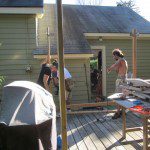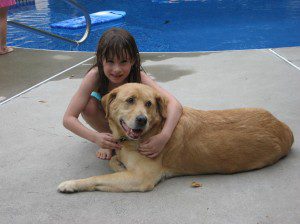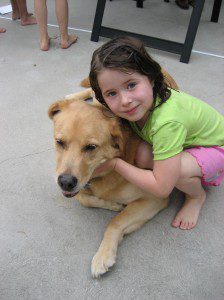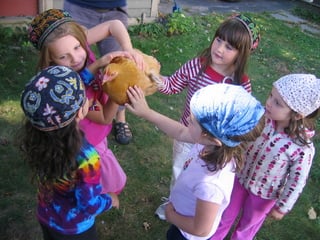Nowhere is ritual more useful than in times of loss. When a loved one dies, it’s comforting to be part of a tradition that tells us what to do and what not to do, what to say and what not to say, and when and how to slowly move through the grief. The guidelines support both the mourner and the community.
When a pet dies, it’s not so clear. So this week, when we had to say goodbye to our beloved Zev, who has been part of our family even longer than our children, I was completely unmoored. Not just by grief, but also by the overwhelming feeling of not knowing what to do. There have been so many decisions to make, and no tradition to inform any of them. Taking my children out of school to go say their goodbyes to Zev is probably the hardest thing I have had to do as a parent. Leaving my husband to hold Zev while the doctor put him to sleep was probably the hardest thing I have had to do as a spouse. Feeling that I shouldn’t call my rabbi two days before Yom Kippur to share any of this, because it wasn’t really his domain, made it all the harder. (Zoe, on the other hand, asked to call a family friend who is a rabbi to talk about what happened. Which she did. Kids are so blessedly free of our stupid hang-ups….)
 Amazingly, and thankfully, the community around us seemed to know exactly what to do. Only a few hours after we made the agonizing decision to put Zev to sleep, food and children’s books about losing a pet arrived at our doorstep. My daughter’s first grade teacher came to our house to give her a hug, and hand-made cards from my older daughters’ friends arrived the next day. We received calls, emails, letters and hugs. When I cried through Kol Nidre, no one looked askance when I explained it was because we had lost our dog that week. Instead they said “I’m so sorry” and “I understand.” When I mentioned that I couldn’t imagine how we were going to get our sukkah up this year, friends showed up at our door today with tools in hand to do it for us.
Amazingly, and thankfully, the community around us seemed to know exactly what to do. Only a few hours after we made the agonizing decision to put Zev to sleep, food and children’s books about losing a pet arrived at our doorstep. My daughter’s first grade teacher came to our house to give her a hug, and hand-made cards from my older daughters’ friends arrived the next day. We received calls, emails, letters and hugs. When I cried through Kol Nidre, no one looked askance when I explained it was because we had lost our dog that week. Instead they said “I’m so sorry” and “I understand.” When I mentioned that I couldn’t imagine how we were going to get our sukkah up this year, friends showed up at our door today with tools in hand to do it for us.
Without a road map, we borrowed a little from tradition, and have made the rest up as we go along. We lit a yahrtrzeit candle for Zev, and bought some bulbs to plant in a few of his favorite digging spots. We’ve lain in bed retelling our favorite Zev stories and hung his collar where his food and water bowl once stood. We’ll wait a few seasons before looking for a new dog, taking time to honor his memory and feel his absence. Zev was the kind of dog that people who hate dogs loved, and people who love dogs admired. He cured more than one child of their fear of dogs, and best of all, he taught my children that a home without a dog simply isn’t complete.
I’d like to close with something brilliant and wise and pithy. Good thing I have friends who are writers to do it for me. Here’s an excerpt from an essay by my friend Pete Nelson who captures so much of what I’d like to say but haven’t the skill. (You can read the whole thing here.) He’s the author of I Thought You Were Dead, a wonderful novel for anyone who loves dogs and probably even the losers those who don’t.
Teaching my son to love dogs may be the best thing I could have taught him. He mauled Alice when he was a toddler, poked her in the eye once, at which she snarled and snapped her correction, but mostly she was his personal living toy to play with, and unlike his other toys, this one wanted to play back. She gained ten pounds, eating the food he knocked from his high chair onto the floor. She licked his face clean, which may have been a mistake, because now he is apparently incapable of cleaning it himself. She gave him, at nine months, his first belly laugh, watching her chase a spot of light on the floor. He learned responsibility from her, charged with feeding her and making sure her water bowl was full. She kept him safe from robbers, who trembled and fled, we assured him, just knowing Alice was in the house. In the end, she taught him the hardest lesson of all, the excruciating pain you feel when someone you love dies, and you can’t love them anymore, and you cry and cry, for a long time.
And then, after a while, you feel a little better.



